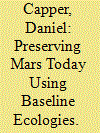| Srl | Item |
| 1 |
ID:
141259


|
|
|
|
|
| Summary/Abstract |
The dual burden of obesity and undernutrition is a significant public health challenge worldwide, especially in the context of a changing climate. This essay presents the most recent nutritional evidence for the optimal diet for long-term health, and offers some commentary on how production of these foods affects the environment. Current dietary research supports a diet rich in fruits and vegetables; nuts, legumes, fish, and some poultry as protein sources; unsaturated fats replacing saturated fats; whole grains replacing refined grain products; dairy foods in low to modest amounts; and minimal amounts of red meat and added sugar. This healthy dietary pattern also supports sustainable agriculture and environmental preservation.
|
|
|
|
|
|
|
|
|
|
|
|
|
|
|
|
| 2 |
ID:
169347


|
|
|
|
|
| Summary/Abstract |
Current calls to protect the Martian environment with “Planetary Parks” maintain environmental merit. However, they lack a sufficiently urgent timeframe for initiating protection and a robust scientific method for the establishment of noteworthy Martian natural landmarks as natural reserves. In response, if we return to the seminal environmental preservation teachings of Aldo Leopold and John Muir, we encounter the importance of grounding Martian preservation efforts on the fundamental environmental science method of a base-datum of normality, or baseline ecology. This method establishes natural reserves that feature both minimal human interference and known origination dates, thereby providing longitudinal environmental control samples for scientific use. Applied before humans appear on Mars, preserved baseline ecologies thereby aid our scientific understanding of human environmental impacts, both now and well into the future, while they enhance a variety of other outcomes in terms of Martian protection. However, the baseline ecology method requires that, through international agreements, we establish these reserves as quickly as possible and certainly before humans arrive on the planet.
|
|
|
|
|
|
|
|
|
|
|
|
|
|
|
|